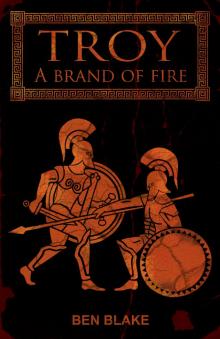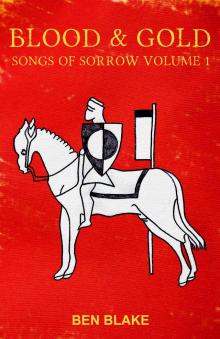Troy: A Brand of Fire Read online
Page 2
*
Boars represent war, and death. They should perhaps have remembered that, those kings, before they gathered for the hunt.
An hour later the chariots had started to come up, bringing the men who had fallen behind as the chase wore on. There were great names among them: some titans of the past, others giants whose time was yet to come. Among the former was Atreus, the High King, stooped and worn now like an old sandal, attended by three pretty handmaidens who rode a chariot of their own. He was stopped and almost completely bald: not one of them was more than seventeen. Most men thought they were for show, a boast for all men to see. Surely Atreus had no use for young women now except to look at, and stir faint memories of the days when blood ran hot in him and the colours of the world were bright and clear. Nobody said so aloud though, or if they did they whispered it behind a cupped hand, and only to trusted friends. Carefully.
The gods gave the House of Atreus pride, men say, but not wisdom. They had given them temper as well, and that was one thing about the High King that had not diminished with the years.
The younger men included three who were judged too young to join the hunt proper, but old enough to ride with the followers, and see the chase unfold. One was Atreus’ younger son Menelaus, the younger brother to Agamemnon, a good charioteer but a soft spear, or so the murmurs said. Alongside him rode Telamon’s towering son Ajax, a man so big he drove his own chariot because the horses couldn’t pull him and someone else besides, not for any distance. A careful distance behind these two came a slim youth with brown hair, nondescript compared to red-haired Menelaus and the looming form of Ajax. He was from a tiny island in the west. His name was Odysseus.
Behind all these came the wagons, each one drawn by eight sweating horses and burdened with sacks of grain and amphorae of wine, great barrels of figs and olives and nuts. Servants leapt down and began to lay out tables, covered with embroidered cloths. Others went to the boar with skinning knives in their hands, only to be stopped by Atreus.
“Let the priest do his work,” he said. “We can wait a little longer for our meat.”
The priest was a servant of Apollo, an old man in a once-resplendent white robe now spattered with mud thrown up by the chariot wheels. He had tried to wipe it off and only smeared the stains instead, making them worse. As he moved forward a new arrival dismounted from his chariot and went to join the other kings, limping slightly on the uneven ground.
“King of Messenia,” Theseus said, inclining his head.
The smaller man nodded back, just as minimally. “Lord of Attica. I see you are well.”
Theseus smiled a tiny smile. “I see you couldn’t keep up.”
Nestor didn’t rise to the taunt. He was almost a decade younger than Theseus, and could have kept up well enough if it hadn’t been for a tummock of grass that snagged his foot and turned his ankle over. Theseus probably knew that anyway. He was just taking his chance to score a point.
It was remarkable, really. Thirty years ago Theseus had been the darling of all Greece, famed for killing the terrible Minotaur of Knossos and throwing down the Minoan civilisation there, almost alone. He’d entered the maze of tunnels beneath the palace and slain the priests and their awful monster, and then slipped away unseen. In the ensuing chaos people fled the city, convinced their bull god had abandoned them, and Theseus found King Minos unguarded and killed him in his own throne room.
On his way home he’d abandoned Ariadne on Naxos Island, tossing her aside now her usefulness was done in a gesture of magnificent contempt.
Then he met Atalanta.
She was famous too, the Arcadian princess who refused to conform. Neither her parents nor their priests could make her obey. Atalanta liked the outdoors, not scented baths and weaving. She dressed in a chiton like a man, and ran or climbed with the boys, and she refused to be caged. Finally her parents gave up trying and just let her run free. By the time she was twenty she was as good a hunter as any man in Arcadia, fleeter of foot than most and better with a bow than anyone in Greece, man or woman. She’d refused a dozen offers of marriage by that time, some from princes of other lands. Her father the king, knowing it was impossible to force her against her will, only shrugged and let her go her way. People began to say she must have sworn an oath of virginity to Artemis, and would never allow any man to touch her.
She and Theseus met when both were hunting a lion in Boeotia, not far from Mount Helicon where the Muses dwell. They were in their prime then, strong and proud, ready to abandon whatever they were doing to go chasing after a beast that rumour said was unusually fierce. Neither spoke of it often, but it was known that they’d killed the lion and then spent a week together, sleeping under the stars and going where the mood took them. They’d been together ever since, though Atalanta had never slept under a roof as far as Nestor knew. Still, her hand on Theseus’ shoulder now stopped him, and with a shake of his head the Athenian turned from Nestor and moved away.
Beyond them all another man stepped down from his chariot, this one dressed not in a chiton but a shirt and kilt, and wearing boots instead of sandals. His brown hair was cut short, barely an inch from scalp to manicured end, more like a slave than a free man. Nestor nodded to him too and went to stand with Peleus, not far from Odysseus and the other younglings.
”Kalapogma Apollo,” the priest said. Murmured conversations came to an end around the field. His voice was slightly nasal, giving each word a whine as it entered the ear. “Hear now your servant Archilaus! I come to you with head bowed, in all honour, in the names of the kings and lords gathered under your light today. Heed my words, Lord of the Bow!”
“Theseus doesn’t like you,” Odysseus murmured, almost in Nestor’s ear. The crackle of a votive fire bowl being lit would have kept anyone else from hearing him speak. “Why?”
“Theseus doesn’t like anyone who can add two numbers and get the same result every time,” Nestor answered in an undertone. “He’s great fighting bull kings, but not much use with his brain, our Theseus. I think it’s mostly fat between his ears anyway.”
There was a pause, and then Odysseus whispered, “You told him that, didn’t you?”
It was hard not to laugh. Odysseus was easily the cleverest of the younger nobles in Greece, though he was still young and naïve enough to think he could speak openly in a gathering of lords and not risk being overheard. Still, it was a shame he’d been born to the king of tiny Ithaca, and not as heir to Mycenae or Sparta, or to wealthy Argolis. He might have changed the world, if he’d been born there. As it was, hardly anyone would listen to Odysseus even when he spoke wisdom.
“I might have said men like him were the past in Greece,” Nestor said, “and men like me, who can think, are the future. Men like you too. Now be quiet, there’s a good lad. I want to listen.”
The woody smell of burnt frankincense wafted over the assembled men as the priest went on speaking. “Send us your favour, Lord of the Sun! We await your word!”
He bent and slit the boar down the middle. The curved knife was whip-sharp, but even so he had to saw it back and forth to penetrate the think skin of the animal at his feet. Innards spilled out onto the grass. An attendant stepped swiftly up and wafted the bowl of burning frankincense under Archilaus’ nose.
The priest’s eyes flickered and he fell to his knees. He had gone pale with that inhaled smoke, and his hands trembled as though palsied. He blinked and his irises were missing, leaving only the whites of his eyes, and when he spoke the nasal whine was gone and his voice throbbed from deep within his chest.
“From this moment the world turns towards war,” Archilaus said. Or the god said through him, in truth. “There will be glory and sorrow unmeasured by mortals, and amidst it shall be the son of the man who first impaled the boar, a warrior ten times greater than his father.”
Afterwards, even years later, Nestor swore that when the priest fell silent a breeze soughed across the valley, ruffling the hair of the silent men. There was no other s
ound. One by one heads turned towards Peleus, standing at Nestor’s side in the wide circle; Atreus and his sons, Theseus with Atalanta by his shoulder, even the stranger in his kilt and boots. It was a great pride for a man to have a renowned son, but a great sorrow to be so insignificant that your get outshone you. What Archilaus had said was a curse. Nestor looked at Peleus and saw, to his surprise, that the big northerner was smiling.
“A toast!” Peleus cried. He strode to the nearest table and scooped up a cup of wine, already watered by the servants. “To my son, who will grow into a warrior to outshine us all. To Achilles!”
The breeze sighed once more, and then time resumed its steady tread, the sun moving across the dome of the sky.

 Troy: A Brand of Fire
Troy: A Brand of Fire Blood and Gold
Blood and Gold